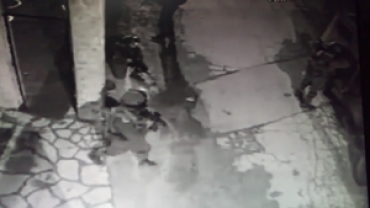At around 6:00 on the evening of Saturday, December 17, a large number of Israeli soldiers came down from their military base to the Lajee Center football (soccer) field and began harassing the young teenagers, aged 14-16, holding their practice there. They searched and threatened the players, hitting one and pushing Lajee Center’s athletics director,Hamada Al-Kurdi. When Lajee Center Media Director Mohammad Al-Azza tried to enter the football field in their defense, soldiers drew their weapons at him andbeat him. This was the second round of Israeli violence in Aida that day. Earlier that afternoon, at around 2:00 pm, Israeli soldiers in a jeep had entered the camp—which was at the time entirely calm—and started shooting tear gas and sound bombs at the houses in Aida.
Al-Azza commented that this attack on him and the general situation in Aida Refugee Camp demonstrated Palestinians’ need for international protection: “International organizations like the United Nations must get involved. It is dangerous for anyone to be in the streets after 5:00 pm.Anyone could be arrested or beaten. Someone could be shot for no reason.” He continued that Palestinian journalists in particular bear the brunt of Israeli violence. “We face constant attacks. It is not easy for anyone who is a journalist in Palestine—not for him or his family. They know that at any moment, a journalist can be killed, injured, or arrested.”
The Israeli army invades the camp on a daily basis. This causes problems for Lajee’s football players. Al-Kurdi explained that the soldiers generally enter the camp at the same time as these players practice, and the soldiers search and question these players. Soldiers threaten to lock the gate to the field and prevent them from playing. The football field is one of the most important community resources that Lajee Center offers.
When soldiers began their attack on the players on Saturday, Al-Azza came down from his office in Lajee to help. He started video recording the soldiers in the street with his phone. The soldiers prevented him from reaching the football field and pointed their loaded weapons at Al-Azza and another camp residentwho had come to help. When the officer in charge came out from the football field to the street, he demanded that Al-Azza turn over his phone. Al-Azza refused, and the soldier hit him on his head. Several of the soldiers threw him to the ground and attacked him. They beat him on his head, neck, back, and stomach with their hands and rifles. They also kicked him. The officer asked him for the passcode to the phone, and when Al-Azza refused to give it to him, they detained him and brought him up to the gate of the military base in the apartheid wall. There, the officer continued to beat him.
The officer seemed to be irritated that Al-Azza was determined to do his job. Al-Azza explained why he had come to the scene: “These youth are under our protection, and plus I am a journalist and I need to do my job.” The officer replied that Al-Azza was not working at the time, and Al-Azza replied, “I am always at work.”
Al-Azza was only released after the material on his phone was erased and after residents of the camp gathered to demand that the soldier let him go.


